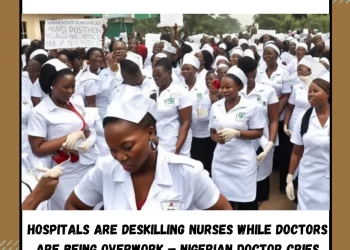Fellow Nurses Africa News, Published July 3, 2025
Tinubu’s Reckless Move: Nigeria Exports Nurses and Doctors to Caribbean Amid Crippling Healthcare Crisis
In a decision that has ignited widespread outrage, Nigeria has signed a Technical Manpower Assistance (TMA) Agreement with Saint Lucia, committing to deploy nurses, doctors, teachers, and agriculturists to the Caribbean nation for two years.
Signed on July 2, 2025, in Castries, Saint Lucia, the move has drawn sharp criticism from the Nigerian Medical Association (NMA), which slammed it as “inexcusable” given the dire state of Nigeria’s healthcare system. The National Association of Nigeria Nurses and Midwives (NANNM) has yet to issue a statement on the deployment, leaving nurses anxiously awaiting their leadership’s response.

A Misguided Pact in a Time of Crisis
The TMA Agreement, formalized by Hon. Yusuf Buba Yakub, Director-General of the Nigerian Technical Aid Corps (TAC), and Janelle Modeste-Stephen, Acting Permanent Secretary at Saint Lucia’s Ministry of External Affairs, requires Nigeria to fund the allowances and logistics of its professionals while host nations like Saint Lucia provide accommodation and local support. Framed as part of President Bola Tinubu’s 4D foreign policy—Democracy, Development, Diaspora, and Demography—the initiative aims to foster South-South cooperation and reconnect with the African diaspora.
However, the NMA has condemned the agreement as a “deeply troubling contradiction” that prioritizes Nigeria’s international image over the welfare of its healthcare workers. In a statement issued on July 3, 2025, NMA Secretary General Dr. Ben Egbo declared, “Exporting doctors while undermining their welfare at home is inexcusable.” The association highlighted systemic issues plaguing Nigerian doctors, including poor salaries, withheld allowances, hazardous working conditions, and a controversial salary circular that undermines their professional dignity. The NMA’s statement comes just a day after issuing a 21-day ultimatum to the government on July 2, 2025, demanding resolution of outstanding welfare issues, including the Medical Residency Training Fund (MRTF), unimplemented collective bargaining agreements, and the flawed CONMESS salary structure.
A Healthcare System on the Brink
Nigeria’s healthcare sector is in a state of collapse, exacerbated by the “Japa” phenomenon, with over 5,000 doctors and countless nurses leaving the country since 2018 due to abysmal remuneration, chronic delays in payments, and unsafe working environments. The NMA warns that the deployment of healthcare workers abroad—such as four nurses to Jamaica and six doctors to Grenada on July 9, 2025—will further deplete an already overstretched workforce. Jamaica’s request for 400 additional experts, with Nigeria footing the bill, has intensified concerns about worsening brain drain.
The NMA’s statement included a stark comparison of salaries, noting that doctors deployed to Saint Lucia are paid up to five times more than their counterparts serving in Nigeria. This disparity, the NMA argues, encourages brain drain and undermines the morale of healthcare workers struggling with burnout, stress, and even death due to overwork. “These challenges have overburdened the doctors left behind, leading to increased morbidity and mortality among Nigerians,” Dr. Egbo stated.
Meanwhile, NANNM’s silence on the deployment has left nurses in limbo. The nursing community, still reeling from the 2024 NANNM strike over unpaid hazard allowances and poor working conditions, is growing increasingly frustrated. As one X user vented, “Tinubu is sending our nurses to Saint Lucia while our hospitals are empty. This is a shameful betrayal of Nigerian patients.”
Cultural Gains vs. Domestic Losses
The government has attempted to justify the TMA Agreement by highlighting cultural exchanges, such as a Nigerian volunteer in Jamaica popularizing Adire fabric, now produced locally as “Jadire” and exported to the U.S. Yakub boasted, “We are exporting Nigeria’s human capital with dignity.” However, these claims fall flat when Nigerian hospitals are critically understaffed, and patients in rural areas lack access to basic care. Peter Obi, a prominent opposition figure, called the deployment a “betrayal of Nigerian children,” criticizing the government’s focus on foreign aid over domestic healthcare and education crises.
During his state visit to Saint Lucia, starting June 29, 2025, Tinubu addressed the Saint Lucian Parliament on June 30, announcing scholarships for Organisation of Eastern Caribbean States (OECS) students to study in Nigerian universities and proposing visa waivers for diplomatic passport holders. He was honored with the Knight Commander of the Order of Saint Lucia (K.C.S.L.) for fostering Africa-Caribbean ties. Yet, these diplomatic gestures have been overshadowed by accusations of neglecting Nigeria’s healthcare emergency.
Implications: A Looming Catastrophe
The NMA warns that this deployment could push Nigeria’s healthcare system to the breaking point, with increased mortality rates and further erosion of public trust. The brain drain is likely to accelerate, as nurses and doctors gain international experience and may choose not to return. The salary disparity highlighted by the NMA—where deployed doctors earn significantly more than those at home—could demoralize remaining healthcare workers and fuel further emigration.
NANNM’s lack of response adds uncertainty to the nursing community’s position. Without a unified stance, nurses risk being sidelined in the fight against this policy. The government’s failure to address longstanding issues—such as the 2024 NANNM strike demands and the NMA’s recent ultimatum—undermines its credibility in justifying this deployment.
A Call to Action for Nigerian Nurses
Fellow Nurses Africa calls on Nigerian nurses to demand accountability from the government and urge NANNM to break its silence. This reckless deployment prioritizes diplomatic posturing over the lives of Nigerian patients and the welfare of healthcare workers. Nurses must advocate for immediate reforms, including competitive salaries, modern facilities, hazard allowances, and retention strategies to curb the Japa tide. The government must reconsider this policy and prioritize strengthening Nigeria’s healthcare system before exporting its scarce talent.
Fellow Nurses Africa is the independent voice of African nursing, we educate, inform, and support the nursing profession
© 2025 Fellow Nurses Africa. All rights reserved.










